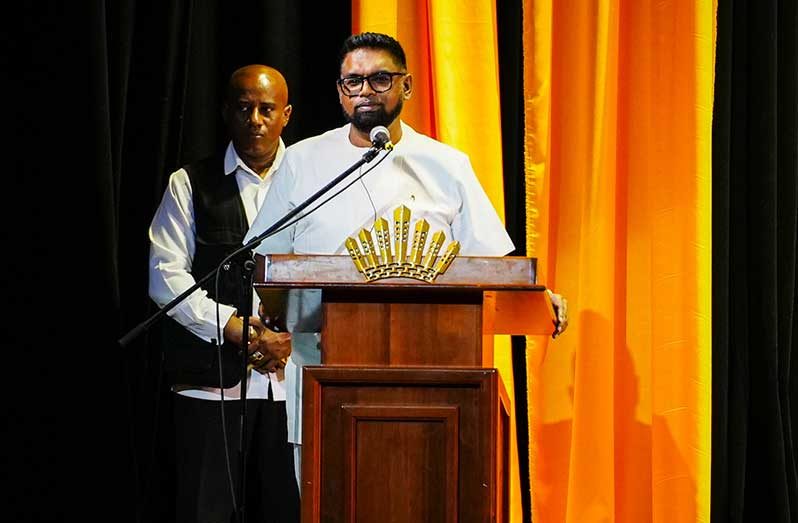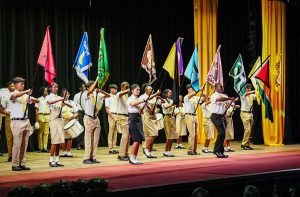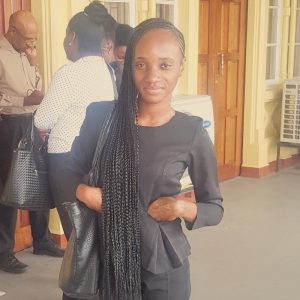-reflects on school’s impact on Guyana’s education landscape
-calls for resilience, empathy and community support in achieving success
QUEEN’S College, one of Guyana’s premier secondary schools, is being celebrated for its long-standing tradition of excellence, as the institution marks its 180th Anniversary.
Speaking at a Special General Assembly held on Monday at the National Cultural Centre, President Dr. Irfaan Ali lauded the school as a beacon of educational achievement, and a symbol of the nation’s potential.
Addressing a gathering of alumni, staff, students, and special invitees, the Head of State reflected on the institution’s rich history, and its pivotal role in shaping Guyana’s academic and professional landscape.
“You have every single right to be proud. You are part of an institution of excellence. You are indeed part of a rich legacy. Let there be no doubt, Queen’s College represents excellence. I am sure without a shadow of a doubt that this institution will continue to produce some of our most illustrious sons and daughters,” he said to resounding applause from the audience.
STAYING CONNECTED TO ROOTS
He emphasised the importance of hard work and the need to fully appreciate both individual effort and the supportive environment that fosters growth and success.
“There is no substitute for hard work, and you should not ever shortchange hard work. So, never ever shortchange your individual ability to be where you are. But also, never shortchange the environment that allows you to grow and achieve this accomplishment. In your individual excellence, do not believe that it is a status that must separate you from the environment that brought you to where you are…,” he stated.
He challenged individuals to reflect on whether they maintain connections with friends and communities from their past, particularly those who may not have had the same opportunities, and to actively support or uplift those who are less fortunate.
“How many of you keep the same friends from primary school that did not do as well as you? How many of you reach backwards to pull that one friend who was not as fortunate as you, forward? How many of you would go to your communities back on weekends and play with the children who you may believe are in a junior school to you?
“How many of you have changed your course of association, and become disconnect from the villages and communities that you came from because we may now believe that we are now part of something different? Yes, you are part of something different, but that must not change what supported you being here,” President Ali added.
FOSTERING UNITY THROUGH COLLABORATION
President Ali, in his captivating address highlighted that in competitive environments like a school, people often compete against each other rather than viewing competition as a way for everyone to succeed together.
“And we don’t see competition as the basis of winning together. And there is a difference in winning by yourself and winning together. Winning together requires you reaching out to those who are not running in front of the race.
“It requires you talking to your colleagues and your friends; understanding where they are in the process of winning, and helping them if there is any gap; supporting each other. Bridging the gap and supporting each other is critical in building on the tradition of the institution. The institution is not the individual,” he pointed out.
EMBRACING VALUES
He later pointed out that true human excellence and brilliance go beyond academic achievements or institutional recognition.
“The measure of human excellence and brilliance is not confined to an examination or an institution. It is about living the traditions and values of that institution. If the institution represents the core values of humanity—humility, tolerance, togetherness, and equity—then if all of us collectively across the country live these values, imagine the different country we could be living in,” he explained.
Moreover, he alluded to the need for service to country, emphasising that the quality of service one provides is not determined by their background or starting point, but rather by essential personal qualities. “It depends on some characteristics that are important: It requires a certain mindset, it requires a certain commitment, it requires a certain inherent selflessness that does not come with prestige, the colour of tie or the uniform you ever wore in your life. It comes with character.”
“What is required of you to carry on this tradition of excellence?” President Ali asked.
To answer his question, he said: “It requires commitment and connection. That is why you see the old students, the parents/teachers’ association, the teachers and all the other support infrastructure still with you today, because they remain connected to the institution,” adding that these have been instrumental in preserving Queen’s College’s legacy of excellence and integrity.
In closing, President Ali gave the attendees advice on how to cultivate a successful mindset.
“You do so by understanding that in this life, you must be resilient and not programmed. The only way to be successful in this changing world is to be resilient, and learn to operate under different circumstances and environments. You must also learn what empathy is; if you don’t know what empathy is, you are never going to be successful…”
During the programme, students showcased their talents through dance, singing and the steel pan. There was also a spoken word tribute to alumnus Martin Carter.
HISTORY OF QC
Queen’s College was established on August 4, 1844, by Lord Bishop William Piercy Austin.
It has since established itself as a symbol of academic excellence and tradition, not only in the local community but also in the Caribbean and beyond.
The school started with 11 boys in the compound of the current location of the High Court in Georgetown, and was called the ‘Colony House’. It commenced as a Grammar School for boys.
In the year 1854, QC relocated to the site which is now occupied by The Bishop’s High School, and later in 1918, it moved once again to a larger facility in order to accommodate a greater number of students at a location that is presently the Ministry of Health on Brickdam, Georgetown.
The college was eventually relocated to its current site at Thomas Lands, Georgetown, in 1954.





.jpg)













